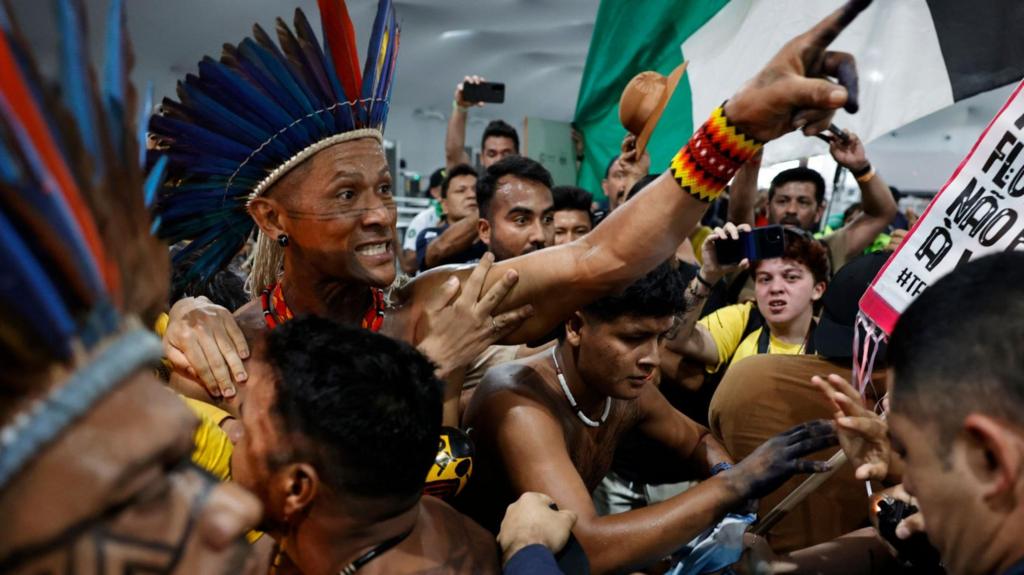Protesters, brandishing signs with slogans such as “Our forests are not for sale,” breached security perimeters at the COP30 climate conference in Belém, Brazil, on Tuesday evening.
BBC journalists on site witnessed United Nations security personnel in pursuit of the demonstrators, with Brazilian soldiers directing delegates to immediately evacuate the premises.
The United Nations reported to BBC News that the incident resulted in minor injuries to two security staff members and limited damage to the venue.
Social media footage depicted protesters, seemingly affiliated with indigenous groups and others, waving flags bearing the logo of Juntos, a left-wing Brazilian youth movement.
Videos circulating online showed protesters, some in what appeared to be traditional indigenous attire, forcibly entering the COP30 venue, chanting and forcing doors open before engaging in confrontations with security personnel.
According to the UN’s statement to the BBC, demonstrators successfully bypassed the initial security barriers but were subsequently prevented from advancing further into the conference site.
Reuters news agency quoted a security guard stating he was struck in the head by a drum allegedly thrown by a protester.
This security breach represents an unusual occurrence at a conference characterized by stringent protocols.
The United Nations has stated that both Brazilian and UN authorities are currently conducting investigations into the incident.
COP30, officially running from Monday, November 10th, to Friday, November 21st, is hosting delegates from nearly 200 nations.
This year’s gathering marks the tenth anniversary of the Paris climate agreement, where countries pledged to pursue efforts to limit the rise in global temperatures to 1.5C.
This is the first time Brazil has hosted the conference, with the talks being held in Belém, situated on the periphery of the Amazon rainforest.
The choice of location has been met with controversy for various reasons, notably due to the presence of Amazon residents, many of whom are outspoken critics of environmental degradation resulting from climate change and deforestation.
Brazil has also continued to issue new licenses for oil and gas, which, along with coal, are fossil fuels and the primary drivers of global warming.
An indigenous leader from the Tupinamba community told Reuters, “We can’t eat money,” expressing discontent over development within the rainforest.
“We want our lands free from agribusiness, oil exploration, illegal miners, and illegal loggers,” he stated.
This year’s meetings have been designated “the Indigenous peoples COP,” with Brazilian organizers vowing to prioritize the inclusion of indigenous voices in the discussions.
Brazil’s Minister of Indigenous Peoples, Sonia Guajajara, hailed COP30 as a “historic” event, estimating that approximately 3,000 indigenous individuals from across the globe would be in attendance.
A UN report released earlier this year indicated that indigenous populations safeguard 80% of the planet’s remaining biodiversity, yet receive less than one percent of international climate funding.
Indigenous communities are disproportionately affected by climate change due to their reliance on the natural environment and its resources.
Brazilian President Luiz Inácio Lula da Silva stated at the summit’s opening that the world must “defeat” climate denialism and combat misinformation.
He explained that the decision to host COP30 in Belém was intended to underscore the Amazon’s crucial role in addressing climate change, adding that “COP30 will be the COP of truth” amidst an era of “misrepresentation” and “rejection of scientific evidence.”
According to the president, the “most diverse biome on Earth” is home to nearly 50 million people, encompassing 400 indigenous groups.
Sign up for our Future Earth newsletter to stay informed on the latest climate and environment coverage with the BBC’s Justin Rowlatt. Outside the UK? Sign up to our international newsletter here.
The world must “defeat” climate denialism and fake news, Brazil’s President Lula da Silva tells UN climate summit.
Dramatic underwater photos capture the elusive Amazonian pink dolphins red-handed.
Campaigners warn of a “hidden link” between tree-felling in the Amazon rainforest and UK pollution.
Benika Lal and Hadil Touihri will be at the climate conference with three academics from the university.
The US president is notably absent from these UN climate talks, as are other world leaders, all of which prompts questions about the purpose of COP today.

